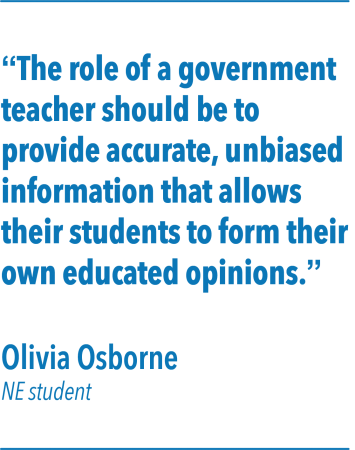| November 13, 2019 | Krissia Palomo | campus editor |
|---|
Over the course of the past few years, America has noticed a rising climb in political discourse, and it seems like nearly everything can turn into a political conversation. Even Texas, which is nearly at the bottom of every voter turnout list, saw an overwhelming turnout in the 2018 midterms.
Two of the classes required to obtain an associate’s degree at TCC are federal government and Texas government. Although it seems like there is no way these classes can be taught without biased information, some professors believe it is their duty to maintain a neutral classroom.
NE government professor Cesar Diaz is among those who have the task of teaching government in a trivial political climate.
“I see [teaching government] as more challenging than difficult,” he said. “The current political climate provides a great opportunity as the instructional facilitator to present authentic critical political thinking activities.”
Diaz encourages his students to form their own educated opinions on issues.
“I attempt to focus on the reality that government is comprised of positional issues,” he said.
Other professors believe it is their duty even more so now to inform those who want to be politically aware. In a state with low political efficacy, the challenge can be a hard one to take.
NW government professor Jack Philips believes that involvement in our government is crucial, and wants to help his students understand why they believe what they do.
“People are becoming more aware of government and how confusing it can be,” he said, “Some people have never really thought much about what they believe or where they stood on issues until now.”
Texas had the sixth-highest voter turnout increase in the nation, seeing an 18% increase from 2014, so there is no denying that people have formed new political ideologies.
Among first-time voters was NE student Olivia Osborne. Osborne has known about issues involving our government since she was in high school, but 2018 was her first time voting.
“The role of a government teacher should be to provide accurate, unbiased information that allows their students to form their own educated opinions,” Osborne said.
There are many factors to take into account when you question political socialization. This may include location, their parents’ beliefs, religion or other demographics such as income, race or gender.
“As students, we are incredibly impressionable,” Osborne said. “We often create our opinions simply by following whatever is believed to be true by our superiors, but with the political world becoming so diverse, that mindset is toxic and really prevents us from reaching our full potential.”

